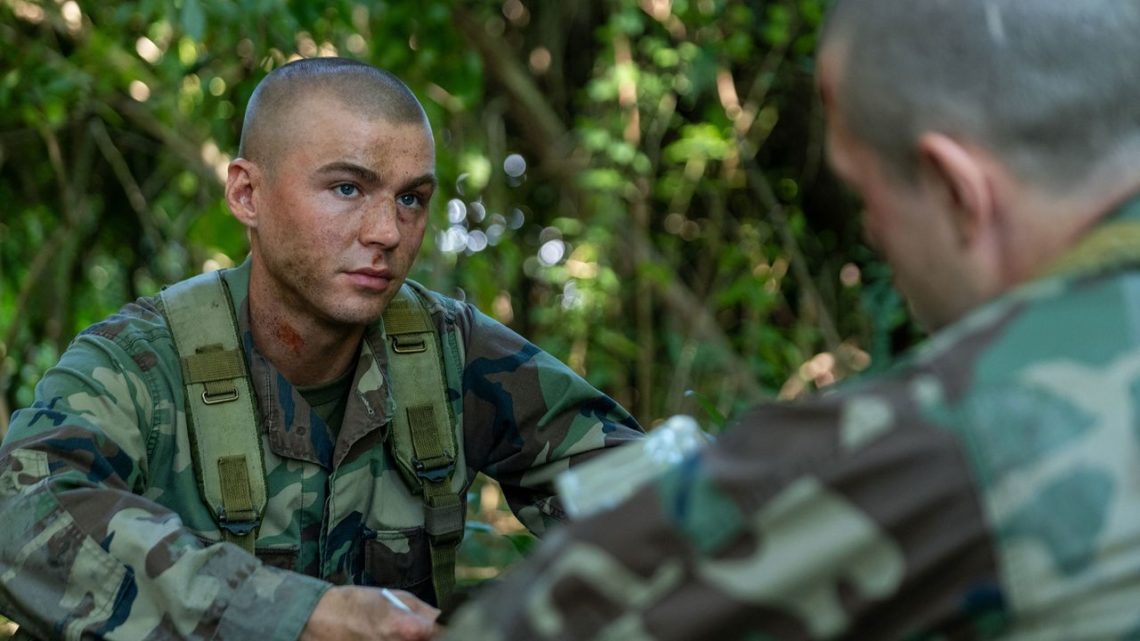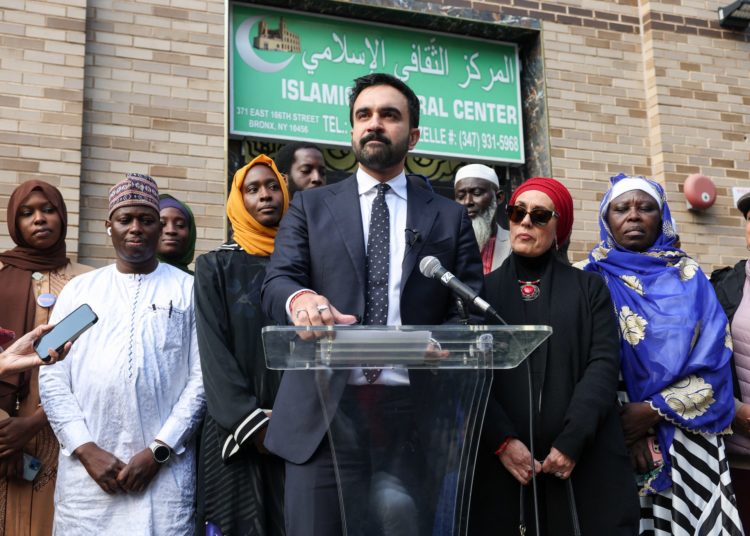“I guess we have to give some credit to the Pentagon there, don’t we?” says Andy Parker, cheekily. His Netflix series Boots—which follows a closeted teen in the 1990s as he enlists in the Marines—has surged to the top of the streamer’s charts since its release on October 9, peaking earlier this week as the No. 2 most-watched series on the platform. That might have something to do with the fact that the Pentagon released a statement on October 16 shading Boots, calling it “woke garbage.”
“Under President [Donald] Trump and Secretary [Pete] Hegseth, the US military is getting back to restoring the warrior ethos. Our standards across the board are elite, uniform, and sex neutral because the weight of a rucksack or a human being doesn’t care if you’re a man, a woman, gay, or straight,” said Pentagon press secretary Kingsley Wilson. “We will not compromise our standards to satisfy an ideological agenda, unlike Netflix whose leadership consistently produces and feeds woke garbage to their audience and children.”
“I would be very surprised if the Pentagon actually watched the show,” Parker says in response. But whether or not Trump or Hegseth have streamed the queer-boot-camp series, perhaps after a long day of very heterosexual activities like remodeling the White House and trying to make the military more buff, the administration slamming Boots has apparently only made it more popular. (Spoilers below.)
“The premise itself instigates or incites some kind of reaction or assumptions,” says Parker of Boots. “What I would invite people to do is to watch the show, and see how they feel about the questions the show is trying to provoke.”
The irony is that in an alternate universe, Parker might have been a drill instructor reporting to Hegseth. “I had been this closeted gay high school kid, and had invited a Marine Corps recruiter to my house to talk with my parents about why I should go join the Marines,” Parker tells me over Zoom. “I was very actively seeking that.” He ultimately decided not to enlist—“I was running away from myself”—but with Boots, he’s getting to experience what might have been.
“There was a personal connection to the idea of a gay kid running off to join the Marines and not really understanding what that was going to do for him, or where that was going to ultimately lead him,” Parker says. “It felt like this was the road not taken. This is a path I could have gone on. How would I have done?”
A TV writer who grew up in a conservative, evangelical home in suburban Phoenix, Parker had worked on queer series like Tales of the City when Sony sent him Greg Cope White’s 2016 memoir The Pink Marine, which detailed White’s experience in the military as a closeted teen. But rather than simply focusing on White’s story, Parker knew he had the opportunity to expand on the memoir with Boots, which he describes as Full Metal Jacket as told by David Sedaris. “I’m not going to do a story of your life,” Parker told White. “I have to have the creative freedom to make this a new person, a different person, and we’re going to send him on his own journey.”
That new person was Cameron Cope, a scrawny gay kid who joins the Marines on a whim, played by openly queer actor Miles Heizer. Finding Heizer, Parker says, was “serendipitous and miraculous.” Though Boots is not only about Cope’s struggles, “I knew I could build an ensemble story around our fish out of water character, and tell a transformation story for each of these guys—not just our main character,” says Parker.
It was important to Parker to cast queer actors—like Heizer, Sachin Bhatt, Jack Cameron Kay, Angus O’Brien, and Max Parker—to play queer roles. Certain corners of the internet seem to really appreciate the decision—and it doesn’t hurt that his cast is easy on the eyes. “There’s a lot of thirst,” Parker admits, with a laugh. “What’s so delightful to see is the really fun behind-the-scenes stuff that’s been captured, where people are getting to see that the brotherhood that we saw develop on screen.”
Though Parker strove to make Boots authentic, the show sits in the middle of a fraught intersection: The right has deemed it too woke, while critics on the left have accused it of being military propaganda. “I certainly never set out to make anything that was propaganda. and I really reject the idea that it is,” says Parker. (For the record, he didn’t set out to make “woke garbage,” either.) “The fact that we seem to be situated between these two different sides is evidence of how the show wants to approach these really thorny, interesting questions. [Boots] is trying to navigate this in a nuanced way that isn’t so overtly strident in its attacks or in its politics. I think it’s after something more subtle.”
As a result, some viewers have been displeased to learn that the show isn’t what they thought it would be. “Some people come in thinking it’s going to be this polemical screed against the military—this really scathing takedown. Other people think it’s going to be this queer fantasia of sexcapade and homoerotic fantasy,” he says. In reality, it’s neither. “What I wanted to do was certainly not to give an unblemished view of the military, but something that was more about the human experience of what it feels like for these guys in this particular time and place to go through this experience.”
Ultimately, Parker never set out to tell an overtly political story. “We were on an emotional mission,” he says. That doesn’t mean that he or the show is apolitical. “There’s politics involved in all of these questions—what’s happening to trans people now, and the policies that are being inflicted on trans service members now. What our show shines the light on is, what is the cost of that?” he says. “What’s the cost to the people who are affected by those policies? What is the cost to the institution itself, when they have to inflict that on service members who want to serve honorably and with dignity?”
In the first season’s final episode, Cope decides to stick with the Marines despite being given a golden ticket out. This isn’t meant to be seen as a full-throated endorsement of the military industrial complex, says Parker, “but for that sense of triumph to be undercut with this question of, ‘Well, what does that mean for Cameron’s soul?” says Parker. “Has he just climbed a ladder that’s leaned against the wrong wall?”
It’s too soon to say whether Cope and his bootcamp comrades will see actual battle in a future season. “We are just waiting to hear good news, we hope, from Netflix, but we are hopeful for a second season,” he says. Even so, Parker is already thinking about how Cope and his Marine Corps will fare as the US hurtles toward the Gulf War. “They’ve become Marines. Now what? They’re going to have to go do the thing that they have now achieved, and that’s going to come with its own costs, with its own challenges, with its own misgivings, with its own sense of, ‘Is this what we bargained for?’”
Either way, Parker is touched by the response to season one, particularly from queer veterans and service members. “That means a lot to me,” he says. It also means a lot that his “woke garbage” also happens to be the last show produced by the late, great Norman Lear. “When I look back on the themes in Norman’s work, it’s about the idea of who gets to be part of the American story, and who gets to be included in that narrative. He was always trying to expand that definition, expand that sense of inclusion,” says Parker. “[Boots] is, in some way, a plea to expand that narrative, to see that this story can be bigger.”
The post ‘Boots’ Creator Andy Parker Didn’t Set Out to Make “Woke Garbage”—or Military Propaganda appeared first on Vanity Fair.




